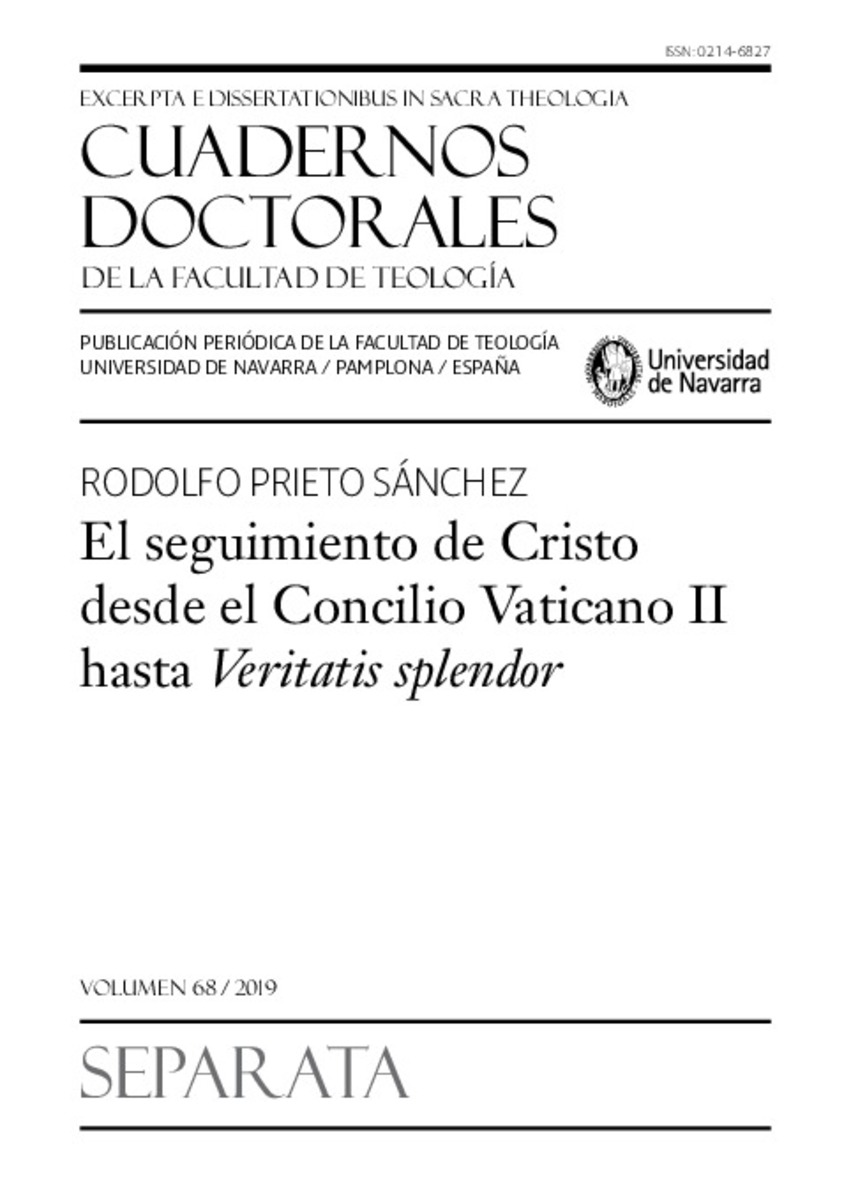Registro completo de metadatos
| Campo DC | Valor | Lengua/Idioma |
|---|---|---|
| dc.creator | Prieto-Sánchez, R. (Rodolfo) | - |
| dc.date.accessioned | 2019-06-05T11:10:17Z | - |
| dc.date.available | 2019-06-05T11:10:17Z | - |
| dc.date.issued | 2019 | - |
| dc.identifier.citation | Prieto-Sánchez, R. (Rodolfo). "El seguimiento de Cristo desde el Concilio Vaticano II hasta Veritatis splendor". Cuadernos Doctorales de la Facultad de Teología. Excerpta e Dissertiationibus in Sacra Theologia. 68, 2019, 289 - 369 | es |
| dc.identifier.issn | 0214-6827 | - |
| dc.identifier.uri | https://hdl.handle.net/10171/57288 | - |
| dc.description.abstract | La Teología Moral experimenta durante el siglo XX un aliento de renovación influenciado por los movimientos litúrgico, bíblico, teológico y filosófico. La estructuración cristocéntrica de la moral surge como camino para aunar la dimensión especulativa y la dimensión práctica de la moral. Sobresale en los autores de este siglo la inspiración bíblica y la esmerada búsqueda de un principio sobre el que fundamentar la vida moral. Es F. Tillmann, el que trae a primer plano el ideal de «seguimiento de Cristo» como configurador de la moral cristiana. El Concilio Vaticano II impulsa la disciplina de la Teología Moral invitándola a nutrirse de la Palabra de Dios y exhorta a los fieles al seguimientoimitación de Cristo. Es la encíclica Veritatis splendor, la que supone un antes y un después, poniendo de manifiesto que la moral cristiana no se reduce a un código de obligaciones, sino que consiste fundamentalmente en el seguimiento y adhesión, por el Espíritu Santo, a la persona misma del Hijo de Dios en su entrega de amor a Dios y a los hombres. Muestra la originalidad de la propuesta moral cristiana, su capacidad para iluminar el camino moral del hombre y resolver las cuestiones complejas que se plantean a lo largo de la historia. A partir de aquí, la moral se revelará como el actuar «filializado» para la gloria del Padre y el amor como experiencia fundante, donde el cristiano asume la forma interior de Cristo, participando de su sentir y vivir por el Espíritu.. | es_ES |
| dc.description.sponsorship | Moral Theology experiences during the 20th century a breath of renewal, developed under the influence of the liturgical, biblical, theological and philosophical movements. The Christocentric structuring of morality emerges as a way to unify its speculative and practical dimensions. The biblical inspiration as well as the careful pursuit of a principle on which moral life should be grounded are two qualities which stand out in the authors of this century. It is F. Tillmann, who brings to the forefront the ideal of «following Christ» as the configurator of Christian morality. The Second Vatican Council promotes the discipline of Moral Theology, in particular by inviting it to nourish itself with the Word of God, and exhorts the faithful to follow-imitation of Christ. It is the encyclical Veritatis splendor, which marks a before and after, showing that Christian morality is not reduced to a code of obligations, but consists essentially in the following and adherence, by means of the Holy Spirit, to the person of the Son of God, in his surrender of love to God and to the human being. It shows the originality of the Christian moral proposal, its ability to illuminate the moral path and solve the complex issues that arise throughout history. From here, morality will reveal itself as the «filialized» act for the glory of the Father and as love as a founding experience, where the Christian assumes the inner form of Christ, participating in his feeling and living by the Spirit. | es_ES |
| dc.language.iso | spa | es_ES |
| dc.publisher | Servicio de Publicaciones de la Universidad de Navarra | es_ES |
| dc.rights | info:eu-repo/semantics/openAccess | es_ES |
| dc.subject | Seguimiento | es_ES |
| dc.subject | moral | es_ES |
| dc.subject | Cristo | es_ES |
| dc.subject | Following | es_ES |
| dc.subject | Christ | es_ES |
| dc.title | El seguimiento de Cristo desde el Concilio Vaticano II hasta Veritatis splendor | es_ES |
| dc.type | info:eu-repo/semantics/article | es_ES |
| dc.publisher.place | Pamplona | es_ES |
| dadun.citation.endingPage | 369 | es_ES |
| dadun.citation.publicationName | Cuadernos Doctorales de la Facultad de Teología. Excerpta e Dissertiationibus in Sacra Theologia | es_ES |
| dadun.citation.startingPage | 289 | es_ES |
| dadun.citation.volume | 68 | es_ES |
Ficheros en este ítem:
Estadísticas e impacto
Los ítems de Dadun están protegidos por copyright, con todos los derechos reservados, a menos que se indique lo contrario.






